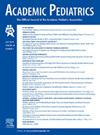Improvement in Pediatric Resident Self-Efficacy and Documentation of Childhood Obesity Care With an Educational Intervention
IF 2.8
3区 医学
Q1 PEDIATRICS
引用次数: 0
Abstract
Objective
Childhood obesity is a public health crisis with increasing rates and long-term complications. Primary care providers are essential to address this concern; however, clinicians report inadequate training and self-efficacy.
Methods
This educational study evaluated the impact of an obesity management curriculum on residents’ self-efficacy and documentation. Three interactive educational sessions were presented. Residents rated their self-efficacy on caring for patients with obesity using a retrospective pre-post anchored–response scale survey. Practice change was evaluated via chart review. Documentation of key history and treatment items was collected utilizing a standardized rubric over a 2-month period, both before and after the education.
Results
Posteducation, self-efficacy ratings were higher compared to pre-education scores (P < .0001). Chart review for 63 residents showed improvement in documentation of history and treatment items (P = .026). Nutrition, activity, and sleep history elements improved in postgraduate level (PGY) 1 residents' documentation compared to PGY2 (P < .0001) and PGY3 residents (P = .004). Documentation of treatment components—including healthy habits counseling, specific, measurable, achievable, relevant, and time-bound goals, lab testing, referrals, and follow-up—increased among all PGY levels (P = .036).
Conclusions
A primary care–based curriculum improved resident self-efficacy in caring for patients with obesity. Documentation of history and treatment items increased for all residents, with greatest improvement by PGY1 residents.
教育干预下儿科住院医师自我效能感及儿童肥胖护理记录的改善。
目的:儿童肥胖是一种公共卫生危机,发病率不断上升,并伴有长期并发症。初级保健提供者对于解决这一问题至关重要;然而,临床医生报告缺乏培训和自我效能。方法:本教育研究评估肥胖管理课程对住院医师自我效能感及档案的影响。举办了三场互动式教育会议。住院医师对照顾肥胖病人的自我效能感进行了回顾性的前后锚定反应量表调查。实践变更通过图表评审进行评估。在教育前后2个月的时间里,使用标准化的标准来收集关键病史和治疗项目的文件。结果:教育后的自我效能评分高于教育前的得分(结论:以初级保健为基础的课程提高了住院医师照顾肥胖患者的自我效能。所有居民的病史和治疗项目的记录都增加了,PGY1居民的改善最大。
本文章由计算机程序翻译,如有差异,请以英文原文为准。
求助全文
约1分钟内获得全文
求助全文
来源期刊

Academic Pediatrics
PEDIATRICS-
CiteScore
4.60
自引率
12.90%
发文量
300
审稿时长
60 days
期刊介绍:
Academic Pediatrics, the official journal of the Academic Pediatric Association, is a peer-reviewed publication whose purpose is to strengthen the research and educational base of academic general pediatrics. The journal provides leadership in pediatric education, research, patient care and advocacy. Content areas include pediatric education, emergency medicine, injury, abuse, behavioral pediatrics, holistic medicine, child health services and health policy,and the environment. The journal provides an active forum for the presentation of pediatric educational research in diverse settings, involving medical students, residents, fellows, and practicing professionals. The journal also emphasizes important research relating to the quality of child health care, health care policy, and the organization of child health services. It also includes systematic reviews of primary care interventions and important methodologic papers to aid research in child health and education.
 求助内容:
求助内容: 应助结果提醒方式:
应助结果提醒方式:


